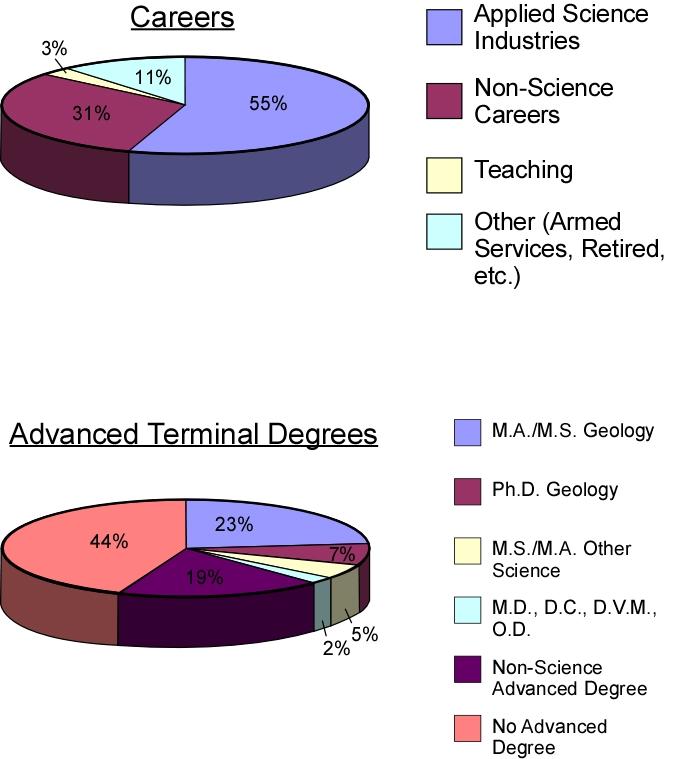Introduction to Dickinson College Earth Sciences
The Earth Sciences major at Dickinson is a journey developing independent thought, problem solving, critical thinking, field, and research skills. This journey produces an earth scientist well prepared for graduate school or a career in industry. The Earth Sciences curriculum emphasizes the traditional geology subdisciplines in an exciting research- and project-based learning environment. The Earth Sciences faculty's teaching approach stresses self-discovery of geologic principles and processes rather than the mere memorization of "facts" solely through texts or lab manuals. The department has a variety of research grade analytical facilities including an XRF, XRD, SEM-EDS, GIS software, and an AA, all of which are used by majors for class and research projects.
Lectures on Geology have been offered from the earliest days of the College when they were included in courses on Natural Philosophy. Thomas Cooper, Professor of Chemistry and Natural Philosophy, included mineralogy in his courses. It was Cooper who arranged to purchase the laboratory apparatus that belonged to Joseph Priestley, the discoverer of oxygen, for Dickinson College in 1811. Henry Darwin Rogers briefly taught here in 1829-30, and went on to a distinguished career in geology. Among his works was the monumental two-volume "Geology of Pennsylvania," published in 1858. In 1946, five geology courses were offered by the College, and in December of 1957 a major in Geology was approved. As we celebrated our 50th anniversary, we found ourselves in new facilities. We have large and dedicated space for all aspects of geology and state of the art equipment for teaching and research. We have graduated a diverse group of earth scienctists over the last 50 years with most going on to excellent graduate schools or directly into the strong job market for geologists.

Department of Earth Sciences Alumni Statistics: 1959 - 2007
The Department of Earth Sciences views its program as a flexible one that allows student to develop a plan of study that meets their interests and goals starting with a set of required core courses. The department is small by Dickinson standards, but offers a diverse range of courses for both majors and non-majors. Any of the department faculty are ready and willing to discuss the range of academic opportunities in Earth Sciences in order to tailor a program to meet students' needs.
The Earth Sciences faculty have an active research agenda covering many sub-disciplines from paleontology to paleoclimatology and geochemistry to structural geology and geomorphology to volcanology. We are interested in students working with us on these projects and expect that each student will become a research “colleague” as together we learn how to work through various problems in geology toward making contributions in the science. Our emphasis, first and foremost, is teaching the students all aspects of the research process from problem formulation to hypothesis building to data collection, analysis, and synthesis to presentation in print or oral presentation form. We highly encourage students to propose their own research projects as well and find an appropriate advisor to take those ideas forward. We are a small department by numbers of majors and faculty; typically 6-8 students per year with four full-time faculty. This gives us advantages that other larger departments in science do not enjoy. Our classes are small allowing for more student-faculty contact and discussion within and beyond the classroom. We get to know our majors very well and can write in-depth recommendations for jobs and graduate schools giving our student significant advantages over larger departments and larger schools. Suffice it to say that, because we are a tight vibrant community, we take care of our students. We are a very field-oriented department meaning we take field trips in all courses that directly add to the classroom experience. We are always finding new ways to teach the basics in earth sciences such that students can better grasp their importance to the ultimate sustainability of the planet.
The Department of Earth Sciences at Dickinson College takes the college's mission of global engagement to heart. Geology is THE global science. It inherently crosses borders due to the nature of the science. For example, plate tectonics operates on a global scale. To be a good geologist, you must see as much of the world as possible. As a result, our science is international in nature as seen in the activities of our faculty and students. Our faculty have worked in North America, Central America, South America, Caribbean, Iceland, Hawaii, Europe, Asia, Australia, and Antarctica as well as the Atlantic and Pacific oceans and the Mediterranean Sea. We have research collaborations with colleagues in the U.S.A., Canada, Mexico, Montserrat, Ireland, England, France, Denmark, Germany, Estonia, Croatia, Italy, and Singapore. Our students have done field work with us in the Continental U.S., Canada, Bahamas, Montserrat, Hawaii, Costa Rica, Ecuador, Chile, Iceland, England, Wales, Estonia, and Australia. Dickinson Geology is THE global science.